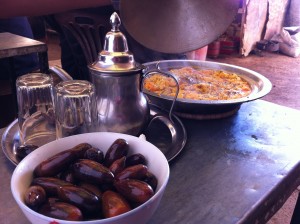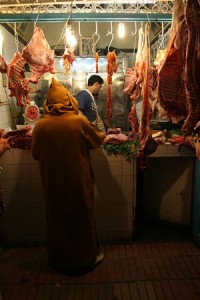Even if your trip to Morocco is mainly centered around the major cities, it is worth getting out for a day into the countryside to see rural life. Although the majority of the Moroccan population now officially lives in urban areas, many retain an attachment to the land and their native town or village. It is worthwhile, therefore, seeing Moroccan life in a different context, as it is still lived by many people. Despite increasing urbanization, the agricultural sector in Morocco still employs around half of the workforce and there is nothing quite like the hub of activity on a Moroccan market day!
On any day of the week, a market (or souk) will take place somewhere in each Province (a region like a State in the US or a county in the UK). The souk often takes place in one of the larger towns or in a village which acts as a hub for the surrounding rural area and local farms. The weekly market is so ingrained in local culture that many towns include the day of their souk in their name. Take a look at a map of Morocco: any town with “el had” in its name has the weekly souk on a Sunday. Likewise, “khamiss” means the market is on a Thursday.
Rural markets provide several essential services for local people. As well as being an opportunity to buy and sell essential items, the souk is a weekly meeting point. Unlike in other cultures, it is mainly men who attend the souk, picking the shopping according to the strict instructions of their wives and mothers. While they are at the market, they take the opportunity to pause for a cup of tea or three and catch up on local gossip with their friends and the itinerant traders.
The weekly souk might also be a chance to use services that we might be more accustomed to accessing on a high street or in a mall. Dotted around the edge of any souk are the barbers’ tents, doing a brisk trade in haircuts and close shaves. And whereas in the West we might park our car in a multi-storey parking lot or leave it with a mechanic for a service, Moroccan farmers tether their donkey at the roadside and catch a taxi to the market, or bring their donkey along for a once-over by the vet or blacksmith.
At the larger markets, for example the Sunday market at Had Dra between Marrakech and Essaouira, early risers will be rewarded with the sight of cattle auctions and camel trading. On-site abattoirs ensure that sheep, cattle and goats traded that morning are slaughtered according to Muslim customs before being sold by the kilo or as a quick barbecued snack for those needing some sustenance before the journey home. People travel long distances to reach the souk and public transport is always packed on market days.
If you have the opportunity to visit a rural market, it is unlikely you will find much of interest to buy. Unless you are self-catering, the heaps of fresh fruit and vegetables are more likely to be of photographic interest than for purchasing. If you do buy something, make sure you buy a sack or a woven basket to carry it in. You will marvel at the recycling ingenuity of rural people, who upcyle tires into feeding troughs, plastic into grocery baskets and old jars into storm lanterns. Pause for a beldy (authentic, rural) breakfast – buy all of the ingredients for your breakfast by weight (a couple of dirhams of tea, a few ounces of sugar and a bunch of mint) and take them to one of the pop-up cafes to have someone brew the super sweet tea. Pick up a freshly baked loaf, a packet of homemade cookies, handful of olives, a half pound of fruit or some grilled nuts. If you dare, grab a couple of bits of meat or offal and have them grilled over charcoal. Your cafe host will supply plates and – depending on your region – some olive or argan oil for dipping your bread in.
If you are based in Marrakech, nearby souks worth a visit include Asni (Saturdays) or Tahanout (Tuesdays). Around Essaouira, as well as Had Dra on Sundays, you can visit Smimou (also Sunday), Akermoud (Saturday), Ida Ougourd or Sidi Mokhtar (Wednesday) or Meskala (Thursday). Depending on your route, these might be a convenient stop-off on your way to/from Marrakech or Agadir. If you are travelling in the Middle Atlas, the Sunday souk at Midelt is large and well-known for local carpets and – in season – apples. Travelling up the coast to Casablanca, the Saturday souk at Oualidia is also worth a visit.
Remember, rural folks live simple, conservative lives. Always dress appropriately (no short shorts or skimpy tank tops) and be discreet when you take photographs. The weather-beaten faces of rural people are fascinating, but the owners do not always welcome the attention of the lens.
Written by Lynn Sheppard
Lynn Sheppard has lived in Essaouira, on Morocco’s Atlantic Coast for more than 2 years, supporting local non-profits, writing and becoming an expert on all things Swiri (ie. Essaouiran). She blogs at Maroc-phile.com and for other travel industry clients.
For more information about Moroccan Souks and Markets outside Marrakech
Morocco’s Imperial Cities, Seaside Resorts,Sahara Desert,Berber villages, A Taste of Morocco, Magical Kasbahs, Ruins & Waterfalls, Absolute Morocco, The Best of Marrakech, Fes, and Ouarzazate




